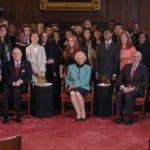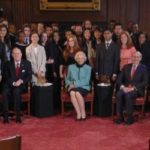Civil Discourse and Difficult Decisions is a national initiative of the federal courts that brings high school and college students into federal courthouses for legal proceedings that stem from situations in which law-abiding young people can find themselves. These court hearings (not mock trials) are realistic simulations that showcase jury deliberations in which all students and learning styles participate, using civil discourse skills. This activity includes: Reality Check Quiz and Discussion Starter; Civil Discourse Skill Building; Courtroom Simulation; and Reality Check Discussion.
Constitutional Conversations and Civil Dialogue
As you read, interpret, and cite the Constitution, it’s important to think about how the Constitution defines or limits the power of the government. That’s how constitutional scholars and judges read, interpret, and cite the Constitution! Check out our Civil Dialogue Toolkit in the National Constitution Center’s learning module.
Civic Conversations
How do educators invest in productive, deep, and transformative dialogue in their classrooms? Civic Conversations is a collaboration between the Kennedy Institute’s civic education programming and the community-building dialogic structure practiced by Essential Partners. Explore resources, activities, and lesson structures that support educators as they facilitate difficult conversations, create inclusive learning environments, raise complex discussions, and promote a safe space for students to consider their values and engage in their communities.
How to Have a Civil Civic Conversation
Filmed on a Constituting America Winner Mentor Trip, five young ladies share their thoughts on how to agree to disagree and how to have a discussion and still remain friends. Through personal experience these students have learned a lifelong lesson. Enjoy learning their lessons while you discuss yours. When watching you will see each person’s name, title and number. The number is their age. The title is the contest area they won in the We the Future contest. Check out the website for the contest information. Who knows maybe soon you will see your talent on the Civics Renewal Network and Constituting America!
The 2015 Baltimore Riots: A Teachable Moment

The Newseum believes that improving civic education has the power to improve our schools, communities and our democracy. The Baltimore unrest can be an entry point in your conversation with students.
The Newseum has numerous resources to help teachers broach this topic in the classroom. Lesson plans, videos and activities guide students in how civil rights issues have been represented in the media over many decades. And how citizens, including young people, can develop a voice and use the freedoms of the First Amendment to effect change and inspire action.
Realizing the Dream Today
Students will analyze a political cartoon depicting Dr. Martin Luther King Jr. and the title of his famous speech, “I Have a Dream.” Discussion of the meaning of the cartoon leads into a more general conversation about rights and equality.
A Conversation on the Importance of the Yick Wo Case
A Conversation on the Importance of the Japanese Internment Cases

Justices Stephen G. Breyer, Sandra Day O’Connor and Anthony M. Kennedy discuss two landmark cases, Korematsu v. U.S. and Hirabayashi v. U.S., in which the Supreme Court tried to strike a balance between individual rights and national security during wartime. The cases stem from President Franklin Roosevelt’s 1942 executive order that mandated the relocation of Japanese and Japanese Americans to internment camps. This video complements the documentary Korematsu and Civil Liberties.
A Conversation on the Constitution: Jury Service
Civic Conversations
How do educators invest in productive, deep, and transformative dialogue in their classrooms? Civic Conversations is a collaboration between the Edward M. Kennedy Institute’s civic education programming and the community-building dialogic structure practiced by Essential Partners. Explore resources, activities, and lesson structures that support educators as they facilitate difficult conversations, create inclusive learning environments, raise complex discussions, and promote a safe space for students to consider their values and engage in their communities. Policy simulations at the Kennedy Institute reflect the wide range of issues that face our country today. Students debate the best way to reform our immigration system, consider the balance between privacy and security, and think about how to meet the challenge of climate change. As in the real Senate, it’s natural that students will disagree on the best approach to many civic issues. This collection of resources will support educators as they prepare to discuss civic issues, either in preparation for a Kennedy Institute field trip or to practice listening, sharing, and learning in the classroom.

